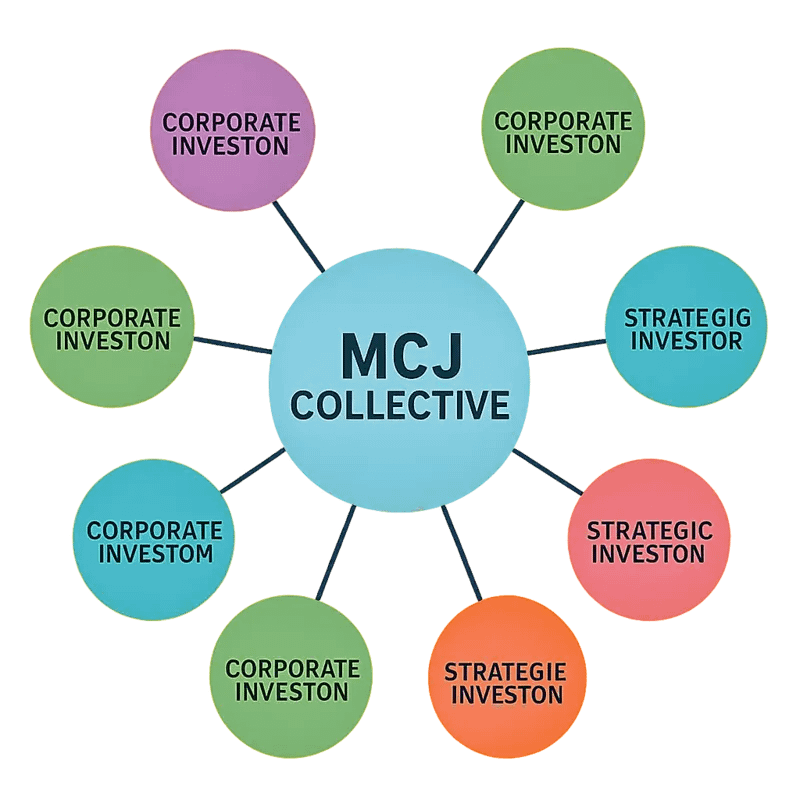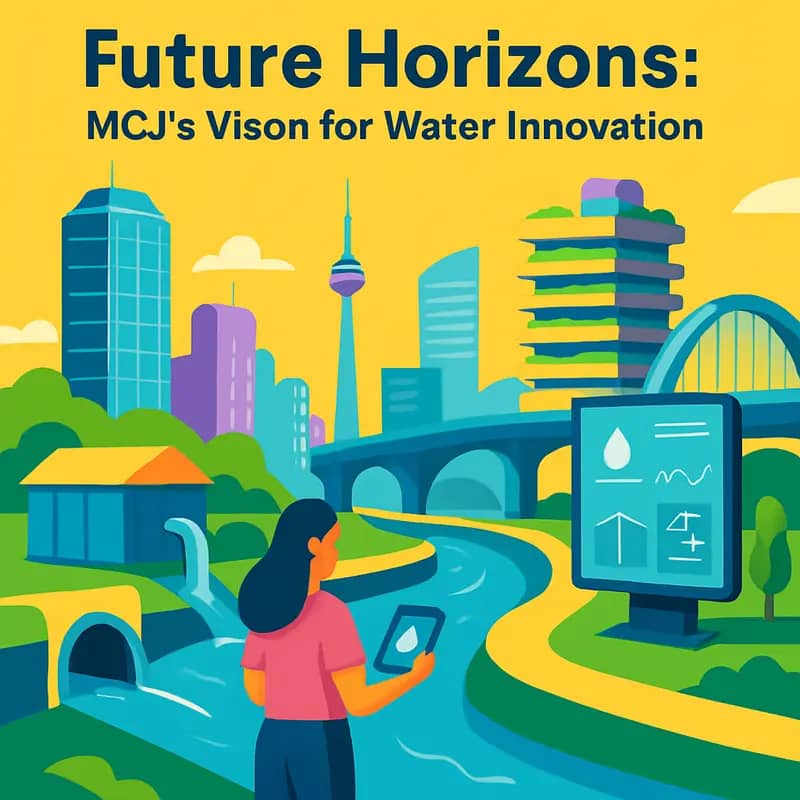In the realm of climate tech investing, MCJ Collective stands as a beacon for water entrepreneurs seeking more than just capital. With over $115 million in assets under management and an average check size of $500,000, this Boston-based fund has carved out a unique position at the intersection of water innovation and climate resilience. Their portfolio, featuring companies like Waterplan and Floodbase, reveals a sophisticated understanding of how water technology can address industrial transformation and infrastructure challenges. For entrepreneurs and investors alike, MCJ Collective represents a new breed of climate tech investors – ones who combine deep sector expertise with a community-driven approach to accelerate the adoption of water solutions.
MCJ Collective is part of my Ultimate Water Investor Database, check it out!
Investor Name: MCJ Collective
Investor Type: VC
Latest Fund Size: $80.6 Million
Dry Powder Available: Yes
Typical Ticket Size: $250k – $1M
Investment Themes: Water risk management for industrial clients, Digital platforms for water resource analytics and planning, Infrastructure resilience solutions for water-related climate risks
Investment History: $14333333.33 spent over 2 deals
Often Invests Along:
Already Invested In: Lilac Solutions, Waterplan
Leads or Follows: Follow
Board Seat Appetite: Rare
Key People:
The Investment Philosophy: Beyond Traditional Water Tech

MCJ Collective’s investment philosophy represents a paradigm shift in water technology funding, anchored in the belief that industrial transformation and infrastructure resilience are key drivers of sustainable water management. Rather than pursuing traditional water treatment solutions, the fund targets innovations that fundamentally reimagine how industries interact with water resources.
With an average check size of $500,000, MCJ strategically positions itself in the early-stage investment landscape where capital is often scarce but potential for impact is highest. This deliberate focus on seed and pre-Series A rounds enables the fund to support entrepreneurs when they most need guidance and resources to validate their technologies and business models.
The fund’s thesis particularly emphasizes solutions that address water challenges at the nexus of climate change and industrial operations. Their approach aligns with the growing recognition that climate adaptation requires robust water risk assessment strategies. MCJ’s portfolio companies typically demonstrate three core characteristics: scalable technology with clear paths to commercialization, potential for significant carbon impact reduction, and business models that can drive widespread adoption across industries.
MCJ’s investment strategy also reflects a deep understanding of the water sector’s unique challenges. Unlike traditional venture capital models that prioritize rapid scaling and exit timelines, the fund acknowledges the longer development cycles typical in water technology. This patient capital approach allows portfolio companies to build robust solutions that can withstand the rigorous demands of water infrastructure and industrial applications.
The fund’s focus on early-stage investments is complemented by hands-on operational support, helping startups navigate complex regulatory environments and lengthy sales cycles characteristic of the water sector. This approach has proven particularly effective in bridging the gap between innovative water technologies and industrial adoption, where traditional funding models often fall short.
By maintaining a concentrated portfolio and deploying capital strategically, MCJ ensures each investment receives the attention and resources needed to succeed. The fund’s emphasis on industrial transformation extends beyond individual technologies to encompass entire systems thinking, recognizing that meaningful water innovation requires changes at both operational and infrastructure levels. This holistic investment philosophy positions MCJ Collective at the forefront of water technology innovation, catalyzing solutions that address both immediate water challenges and long-term climate resilience.
Portfolio Deep Dive: Water Risk and Digital Solutions

MCJ Collective’s investment thesis around water technology comes to life through strategic investments in companies leveraging data and digital solutions to address water risk. Two standout portfolio companies exemplify their approach to transforming industrial water management through technology-enabled solutions.
MCJ’s portfolio companies are pioneering predictive analytics and risk assessment platforms that help industrial clients quantify and manage their water-related risks. These solutions combine satellite data, weather forecasting, and machine learning to provide actionable insights about potential disruptions to water supply, regulatory compliance issues, and climate-related vulnerabilities.
The impact of these investments extends far beyond individual company success. For instance, one portfolio company’s platform has enabled Fortune 500 manufacturers to reduce their water consumption by 30% through real-time monitoring and optimization. Another has helped major food and beverage companies save millions in operational costs by predicting and preventing water-related supply chain disruptions.
These solutions are particularly vital for water-intensive industries like mining, agriculture, and manufacturing. By providing granular data on water availability, quality, and regulatory risks, the platforms enable companies to make informed decisions about facility locations, infrastructure investments, and operational strategies.
The resilience focus of MCJ’s water tech investments extends to flood risk management and adaptation. Their portfolio includes companies developing advanced flood monitoring and prediction systems that combine IoT sensors, satellite data, and hydrological modeling. These solutions help insurers, municipalities, and property developers better understand and price flood risk while implementing effective mitigation strategies.
What sets these investments apart is their scalability and network effects. As more companies adopt these platforms, the underlying datasets become richer, improving prediction accuracy and expanding use cases. This creates a virtuous cycle that accelerates both commercial success and positive environmental impact.
Aligning with MCJ’s broader mission, these water technology investments demonstrate how data-driven solutions can simultaneously generate attractive returns while addressing critical environmental challenges. The fund’s thesis that digital transformation in water management represents a massive market opportunity is being validated through rapid customer adoption and expanding use cases across industries.
Read more about leveraging water risk assessment to unlock business opportunities in the water sector.
The Co-Investment Strategy: Building Powerful Syndicates

MCJ Collective’s approach to co-investment exemplifies a sophisticated understanding of how strategic partnerships can accelerate water technology adoption. By deliberately positioning itself as a follower investor, MCJ has created a unique value proposition that benefits both portfolio companies and co-investment partners.
At the core of MCJ’s co-investment strategy lies the recognition that water resilience solutions require diverse expertise and market access. The fund actively seeks partnerships with corporate investors from insurance companies, who bring deep knowledge of climate risk assessment, maritime shipping operators who understand global water logistics, and construction firms with extensive infrastructure deployment experience.
This follower investment style serves multiple strategic purposes. First, it allows MCJ to leverage the due diligence capabilities of established industry players, reducing technology risk while gaining valuable market insights. Second, it ensures portfolio companies gain immediate access to potential customers and distribution channels through their corporate co-investors.
One particularly effective aspect of MCJ’s approach is their focus on building syndicates that combine complementary capabilities. For instance, when investing in water risk analytics platforms, they typically pair insurance industry investors, who understand risk modeling, with infrastructure operators who can provide real-world validation data. This creates a powerful feedback loop that accelerates product development and market adoption.
The fund’s co-investment framework emphasizes alignment between strategic interests. Rather than pursuing traditional venture capital terms, MCJ structures deals to incentivize long-term collaboration between portfolio companies and corporate partners. This often includes provisions for pilot projects, data sharing agreements, and joint development initiatives that extend beyond simple equity investments.
As explored in how to mitigate 4 shades of water risk through impact investing, this collaborative approach has proven especially valuable in navigating the complex regulatory and adoption challenges typical in the water sector. Corporate partners provide crucial market validation and compliance expertise, while MCJ contributes startup acceleration capabilities and connections across its broader climate tech portfolio.
The success of this strategy is evident in the fund’s portfolio companies’ ability to scale more rapidly than typical water technology startups. By having pre-aligned customer relationships and industry partnerships from day one, these companies can focus on technology development and execution rather than business development. This has resulted in notably shorter paths to commercial adoption and more efficient use of capital across the portfolio.
Future Horizons: MCJ’s Vision for Water Innovation

MCJ Collective’s forward-looking investment strategy centers on transformative water technologies that can scale globally while delivering measurable climate impact. Building on their established co-investment approach, MCJ is strategically expanding their water innovation portfolio across three key domains.
First, the fund is doubling down on water reuse and efficiency technologies that can help communities and industries adapt to increasing water scarcity. MCJ sees particular promise in modular, decentralized treatment systems that can be deployed rapidly in water-stressed regions. Their investment thesis aligns with growing market demand for solutions that can turn wastewater into a valuable resource while reducing energy consumption and operational costs.
Second, MCJ is actively pursuing opportunities in digital water technologies and AI-enabled solutions that can optimize water infrastructure performance. The fund recognizes that smart sensors, predictive analytics, and automated control systems will be crucial for maximizing the efficiency of both existing and new water assets. They are specifically targeting innovations that can help utilities and industrial operators reduce non-revenue water losses, predict maintenance needs, and make data-driven decisions about infrastructure investments.
Third, MCJ is exploring emerging technologies for removing novel contaminants like PFAS while recovering valuable resources from wastewater streams. The fund views this intersection of environmental protection and resource recovery as a key growth area, particularly as regulations around micropollutants tighten globally.
Critically, MCJ’s future investment strategy emphasizes solutions that can scale through strategic partnerships and clear paths to commercialization. The fund maintains a strong focus on companies that demonstrate both technical innovation and business model innovation – particularly those leveraging water-as-a-service approaches to reduce adoption barriers. This dual focus reflects MCJ’s understanding that sustainable impact requires sustainable business models.
For follow-on funding, MCJ is developing a structured framework to evaluate portfolio company progress against both financial and impact metrics. Companies that demonstrate strong market traction and measurable climate benefits will have access to additional capital to accelerate their growth. This approach allows MCJ to concentrate resources on their highest-potential investments while maintaining a diversified early-stage portfolio.
Ultimately, MCJ’s vision extends beyond individual investments to catalyzing broader transformation in how water resources are managed globally. By bringing together strategic co-investors, accelerating commercialization timelines, and maintaining rigorous impact measurement, MCJ aims to demonstrate that water innovation can deliver both strong financial returns and meaningful climate resilience benefits.
The Genesis of Democratic Climate Tech Investment

When Jason Jacobs launched his podcast exploring climate solutions, he likely didn’t envision it would evolve into one of the most innovative investment platforms in climate tech. Yet MCJ Collective’s emergence represents a watershed moment in democratizing access to climate technology investments, particularly in the critical water sector.
The transformation from media platform to investment vehicle wasn’t merely opportunistic – it was a deliberate response to a clear market gap. Traditional venture capital often excluded retail investors while simultaneously overlooking promising early-stage climate solutions. MCJ Collective’s novel approach combines crowd-sourced due diligence with professional fund management, creating a unique hybrid that maintains institutional-grade standards while expanding participation.
At the core of MCJ’s success is its community-driven model that harnesses collective expertise. Members range from climate scientists and water technology experts to experienced investors and industry operators. This diversity enables thorough technical evaluation while ensuring commercial viability assessment. The result is a refined deal flow that benefits from multiple perspectives, particularly crucial in complex domains like water innovation.
The fund’s $115M in assets under management reflects growing confidence in this democratic approach. More importantly, it demonstrates that broadening access doesn’t mean compromising on impact or returns. MCJ’s portfolio companies must meet stringent criteria for climate benefit potential, with water-focused investments requiring clear pathways to meaningful environmental outcomes.
This approach particularly resonates in water technology, where technical complexity often creates barriers for traditional investors. MCJ’s community includes water sector veterans who can properly evaluate solutions across the water cycle – from innovative treatment technologies to smart infrastructure systems. Their expertise helps bridge the knowledge gap that typically hinders investment in water innovation.
Perhaps most significantly, MCJ’s model is reshaping how climate tech investments are evaluated and structured. The collective’s transparent approach to deal analysis and impact measurement is setting new standards for the industry. Members actively participate in due diligence, sharing insights and challenging assumptions in ways that strengthen investment decisions.
As explored in “3 Powerful Tactics Impact Investing Shall Better Use to Save the World,” MCJ’s innovative approach demonstrates how democratizing investment access can accelerate the deployment of crucial environmental solutions. Their success proves that when properly structured, broader participation in climate tech investing can enhance rather than dilute investment quality.
Water Innovation Through Community Lens

MCJ Collective’s unique approach to water technology investment stems from its robust community of climate tech experts, entrepreneurs, and industry veterans. This diverse network creates a powerful feedback loop that enhances both deal sourcing and due diligence while providing invaluable support to portfolio companies.
The collective’s community-driven model enables water technology entrepreneurs to tap into a vast pool of technical expertise and operational experience. When a potential investment in water innovation emerges, MCJ can rapidly mobilize subject matter experts from its community to evaluate the technology’s feasibility, market potential, and environmental impact. This distributed intelligence model proves particularly valuable in water technology, where solutions often require cross-disciplinary understanding spanning chemistry, engineering, biology, and environmental science.
Beyond technical validation, MCJ’s community provides entrepreneurs with practical insights into regulatory compliance, market entry strategies, and customer acquisition. Water technology startups face unique challenges in navigating complex regulatory frameworks and lengthy procurement cycles. The collective’s members, many of whom have successfully scaled water businesses, offer mentorship that helps founders avoid common pitfalls and accelerate their path to market.
The community’s diversity also brings fresh perspectives to water innovation. Members from adjacent sectors like energy, agriculture, and manufacturing often identify unexpected applications or novel approaches to water challenges. This cross-pollination of ideas has proven particularly valuable in areas like water reuse, where solutions must balance technical effectiveness with economic viability and social acceptance.
MCJ’s community acts as a powerful amplifier for portfolio companies. Members frequently become early adopters, pilot partners, or strategic advisors, helping startups validate their technologies in real-world conditions. This built-in network effect can significantly reduce the time and resources required to achieve product-market fit.
Particularly noteworthy is how MCJ leverages its community to address water equity issues. Members with experience in developing markets or underserved communities help evaluate technologies not just for their commercial potential but for their ability to democratize access to clean water. This alignment with broader social impact goals has helped MCJ identify and support innovations that might be overlooked by traditional venture capital firms.
The collective’s water technology investments benefit from what could be called a “compound expertise effect.” Each new member and portfolio company adds to the community’s collective knowledge, creating an ever-expanding foundation of expertise that benefits future investments and entrepreneurs. This virtuous cycle has established MCJ as a uniquely positioned player in water innovation funding, capable of providing both capital and the ecosystem support necessary for successful commercialization.
Deal Flow and Due Diligence Excellence

MCJ Collective has developed a sophisticated yet agile approach to evaluating water technology investments that sets them apart in the climate tech funding landscape. Building on their community-driven foundation, the fund implements a multi-layered due diligence process that combines technical expertise with practical market validation.
At the heart of MCJ’s deal evaluation process lies their distributed intelligence network. Rather than relying solely on in-house analysts, they tap into their vast community of water industry professionals, engineers, and operators who provide real-world insights into technology applications and market fit. This approach mirrors successful models highlighted in the water sector, where practical expertise proves crucial for investment success.
The fund’s evaluation framework centers on three core pillars: technical validation, market potential, and impact metrics. Technical validation involves rigorous assessment of the technology’s fundamental principles, scalability, and operational requirements. MCJ’s technical committees, composed of subject matter experts, conduct deep-dive analyses of each solution’s underlying science and engineering principles.
Market potential assessment leverages MCJ’s extensive network to validate customer pain points and willingness to pay. The fund maintains ongoing relationships with major water utilities, industrial users, and agricultural operations, enabling rapid market feedback on proposed solutions. This real-world validation helps identify technologies that not only solve technical challenges but also address genuine market needs with viable business models.
The impact metrics evaluation distinguishes MCJ’s approach by quantifying both environmental and financial returns. The fund has developed proprietary frameworks to assess water conservation potential, energy efficiency improvements, and carbon emission reductions. These metrics are weighted alongside traditional financial indicators to ensure investments align with both climate impact goals and return requirements.
What sets MCJ’s due diligence process apart is its iterative nature. Rather than treating evaluation as a one-time gate, the fund maintains ongoing dialogue with potential portfolio companies, providing feedback and guidance even before formal investment consideration. This approach helps strengthen promising technologies and creates a robust pipeline of investment-ready opportunities.
The success of this methodology is evident in MCJ’s portfolio performance, with water technology investments demonstrating both strong market traction and measurable environmental impact. The fund’s ability to identify and support breakthrough water technologies while maintaining rigorous investment discipline has established them as a trusted partner in the water innovation ecosystem.
Future of Water Tech Investment

MCJ Collective’s innovative approach to water technology investment stands poised to fundamentally reshape how capital flows into this critical sector. Their systematic blend of community-driven expertise and rigorous due diligence creates a powerful model for identifying and accelerating breakthrough solutions.
The fund’s emphasis on early-stage investments in water resilience technologies addresses a critical gap in the current funding landscape. Traditional venture capital has often overlooked water innovation due to long development cycles and complex regulatory environments. MCJ’s specialized focus and deep sector knowledge enables them to evaluate technical risk more effectively and provide strategic support beyond just capital.
What makes MCJ’s model particularly transformative is their ability to unlock new sources of capital through strategic partnerships and co-investment structures. By creating clear pathways for institutional investors to participate in water technology opportunities, they’re expanding the total pool of available funding. Their approach of combining subject matter experts with professional investors helps bridge the knowledge gap that has historically limited institutional participation in the sector.
The fund’s commitment to accelerating innovation goes beyond simple financial returns. Their portfolio companies benefit from MCJ’s extensive network of industry connections, technical advisors, and potential customers. This ecosystem approach helps startups navigate the complex path from technology development to market adoption more efficiently.
Looking ahead, MCJ’s model could catalyze a new wave of water technology investment by demonstrating that early-stage water innovations can deliver both environmental impact and attractive financial returns. Their success in raising $115M signals growing institutional appetite for water technology opportunities when properly structured and supported.
The fund’s approach also helps address one of the water sector’s persistent challenges – the need to accelerate the pace of innovation adoption. By providing portfolio companies with connections to potential customers and implementation partners, MCJ helps reduce the traditionally long sales cycles in the water industry.
Perhaps most significantly, MCJ’s model creates a template for other specialized investment vehicles focused on climate-critical sectors. Their systematic approach to evaluating and supporting early-stage companies while managing technical risk could be adapted for other areas where traditional venture capital models have struggled to gain traction.
As climate impacts increasingly affect water availability and quality worldwide, MCJ’s investment thesis around water resilience appears well-positioned for long-term growth. Their ability to identify and scale solutions that address critical water challenges while delivering market-rate returns could help catalyze the broader transformation needed in water infrastructure and management practices.
Final words
MCJ Collective’s approach to water technology investment represents a sophisticated evolution in climate tech funding. Their strategic positioning as a follower investor, combined with their robust network of co-investors and focus on early-stage opportunities, creates a unique value proposition for water entrepreneurs. With over $115 million in assets under management and a clear focus on industrial transformation and infrastructure resilience, MCJ has demonstrated that successful water tech investing requires more than just capital – it demands a deep understanding of both technological innovation and market dynamics. Their portfolio companies, from Waterplan to Floodbase, showcase how targeted investments in digital solutions and risk management platforms can drive meaningful progress in water resource management. As the water technology sector continues to evolve, MCJ Collective’s community-driven approach and strategic co-investment model position them well to shape the future of water innovation. For entrepreneurs and fellow investors in the water space, MCJ’s journey offers valuable lessons in how to build and scale impactful water solutions while maintaining a sharp focus on climate resilience and industrial transformation.
Wanna explore the Full List of Water Investors that cut at least two checks over the past decade? Check it out and bookmark it, I update it regularly!
Learn more: https://dww.show/the-ultimate-water-investor-database/
About us
Through my ‘(don’t) Waste Water’ platform, I offer unique and insightful coverage of the water industry that combines technical expertise with engaging storytelling. If you haven’t yet, it might be time for you to subscribe to the podcast, the youtube channel and/or the newsletter!
